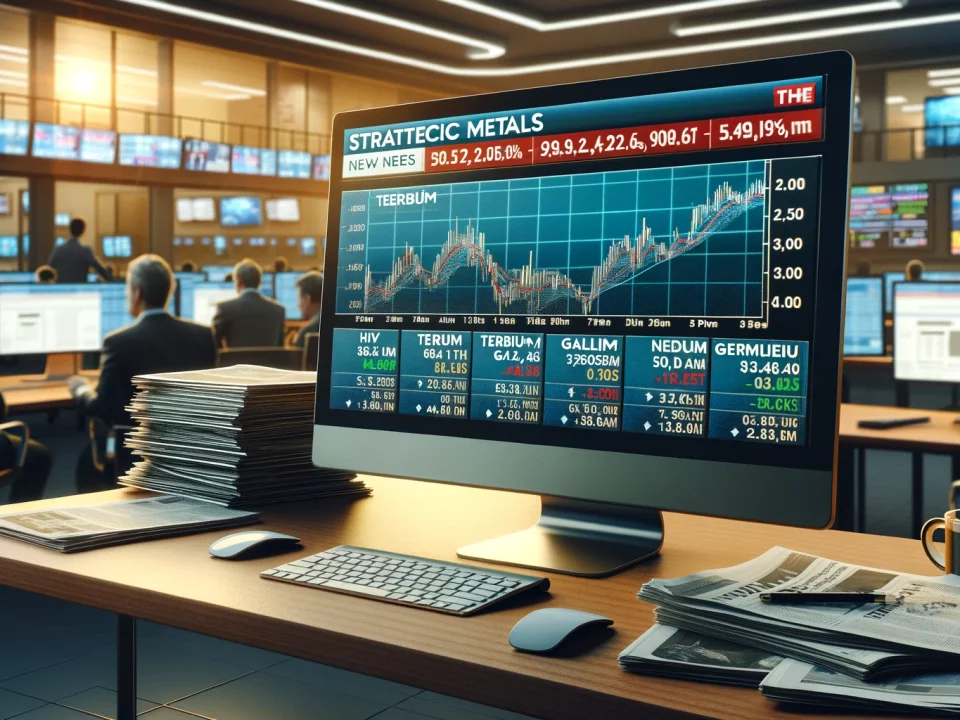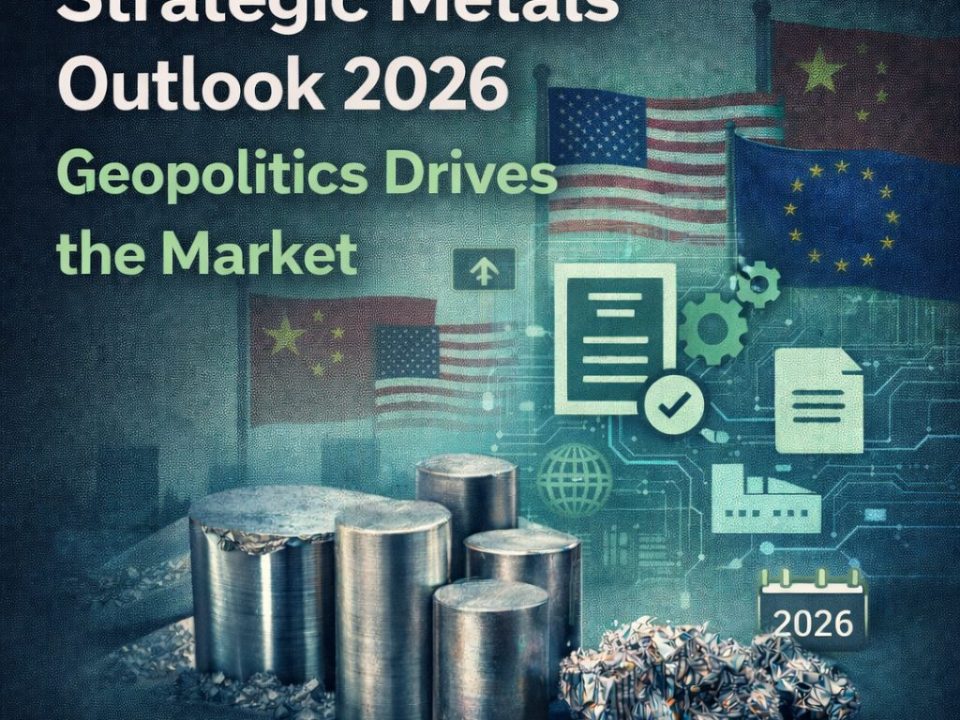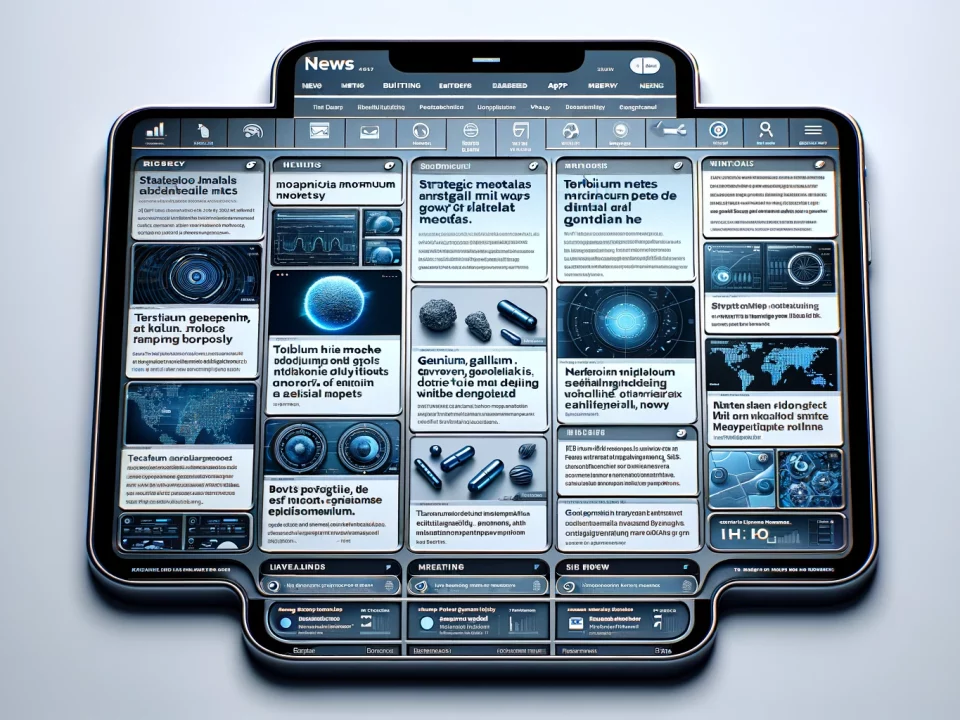
What We Can Learn From China’s Recent Export Controls
May 27, 2025
Weekly News Review June 2 – June 8 2025
June 8, 2025This week, domestic critical mineral supply chains in the United States made progress, with the Army investing in an antimony project and USA Rare Earth accelerating the magnet supply chain. Meanwhile, in Europe, Ionic Rare Earths aims to accelerate the recycling of rare earth magnets through a new partnership.
Greetings from the newsroom, all this and more in our weekly news round-up.
US ARMY INVESTS IN DOMESTIC ANTIMONY SUPPLY CHAIN:
The U.S. Army has pledged up to $6.9 million in funding to domestic mining company Perpetua Resources. The funds come from the Department of Defense Ordnance Technology Consortium, the Pentagon’s central research and development hub for weapons technologies. The goal is to test whether Perpetua’s future Stibnite mine can supply material that meets military standards for the production of antimony trisulfide, an essential component in certain types of ammunition and advanced weapon systems.
This latest funding builds on a previous $15.5 million grant the company received in 2023 from the Department of Defense. That earlier investment was designated for the development of a modular pilot plant capable of processing not only antimony but also other strategically essential materials for the defense sector. With the additional funding, Perpetua plans to expand the plant’s capacity. In total, the company reports it has received over $80 million in federal funding from the Pentagon.
China Has Banned Exports of Antimony to the USA:
China, the world’s leading supplier of antimony, halted exports of the critical material to the United States at the end of 2024. Perpetua’s Stibnite project is the only known domestic source of antimony and is expected to meet approximately 35% of U.S. demand during its first six years of production. The U.S. government granted final approval for the Stibnite mine last week (we reported). The project is among a select group of strategic mineral initiatives designated for fast-tracked permitting to enhance national supply chain security.
“Antimony trisulfide is an irreplaceable component in over 300 types of munitions,” said Colonel Steven Power, Project Director at the Picatinny Arsenal, a U.S. government weapons and ammunition research facility. “A fully domestic supply chain is vital to the security of our armed forces.”
IONIC SIGNS MOU TO EXPAND RARE EARTH MAGNET RECYCLING:
Critical minerals from magnets recovered from end-of-life products to be reclaimed in Belfast.
Ionic Rare Earths has signed a Memorandum of Understanding with scrap metal company European Metal Recycling (EMR) to advance rare earth magnet recycling efforts (PDF). The agreement will see both companies collaborate on recovering magnets from end-of-life products, which will serve as feedstock for Ionic’s UK-based subsidiary’s recycling facility, currently under development in Belfast, Northern Ireland. A demonstration plant at the site launched full-scale production last year.
To support future commercial plant operations, Ionic is continually expanding its feedstock supply streams. In February, the company signed a similar agreement with South Korean magnet manufacturer DNA Link, extending its supply chain into Asia. To expand its existing partnerships, Ionic has also secured funding from the UK government, highlighting the importance of recycling for European supply chains.
The now-signed agreement links Ionic with a globally operating scrap company, which could open new supply streams. In addition, EMR is already engaged in several UK-government-supported rare earth recycling initiatives, underpinning its expertise, for example, through Re-RE Wind, a program focused on extracting magnets from decommissioned wind turbines.
USA RARE EARTH AND POLARSTAR MAGNETICS COOPERATE ON DOMESTIC MAGNET PRODUCTION:
The companies aim to form a domestic supply chain of rare earth magnets, a field currently dominated by China.
USA Rare Earth and magnet maker PolarStar Magnetics have signed a Memorandum of Understanding (MoU) to advance the domestic production of neodymium magnets or NdFeBs. Under the agreement, both companies aim to deliver magnets manufactured entirely in the United States to strategic sectors, including aerospace and defense. Currently, over 90% of the global rare earth magnet production capacity is located in China, making the U.S. and the rest of the world highly dependent on imports.
As part of the collaboration, PolarStar will participate in early-stage testing at USA Rare Earth’s magnet facility in Stillwater, Oklahoma. In January, the company produced the first batch of sintered magnets at the site and is now expanding operations toward commercial-scale output.
USA Rare Earth is one of the few U.S. businesses engaged in the entire rare earth value chain, from mining to magnet production, as it also holds mining rights to the Round Top Mountain deposit in Texas. So far, the company has only produced samples of rare earths, however.
The only commercially operating rare earth mine in the U.S. is the Mountain Pass mine in California, operated by MP Materials. The Las Vegas-based company is also aiming to enter the magnet market, having recently begun producing rare earth metals at its new magnet facility in Fort Worth, Texas.
AUSTRALIA: LYNAS TO PROCESS RARE EARTHS FROM MALAYSIA –
The Australian mining company operates a refinery in the Southeast Asian country. Now, locally sourced material is also set to be processed there.
The Australian rare earths producer Lynas plans to diversify its sources of raw materials. Until now, the company has processed material from its Mount Weld mine in Western Australia at its separation facility in Malaysia. In recent months, initial processing steps have also been carried out at Lynas’s new refinery – the first of its kind in Australia. In the future, raw materials will also be sourced directly from Malaysia and processed locally. This could partially eliminate transport routes from Australia to Malaysia, making the supply chain more efficient.
On Friday, the mining group announced the signing of a corresponding Memorandum of Understanding with Menteri Besar Inc., the strategic investment arm of the Malaysian state of Kelantan. The agreement aims to secure supplies of mixed rare earth carbonate. The raw material is to be sourced from ion adsorption clays – deposits that are particularly rich in heavy rare earths, which are in high demand for growing markets such as electric mobility. Ion adsorption clays are found in tropical and subtropical regions with intense weathering.
Currently, these deposits are only mined on a large scale in southern China and neighboring Myanmar. Compared to conventional mining operations, these clays are significantly easier to extract.
China’s Export Controls Shift Focus to Heavy Rare Earths:
In early April, China introduced export controls on most heavy rare earth elements, affecting global supply. In mid-May, Lynas announced a milestone: the first production of separated heavy rare earths outside the People’s Republic. Shortly before, the mining group had expressed interest in acquiring deposits in Malaysia and Brazil to diversify its value chain further.






